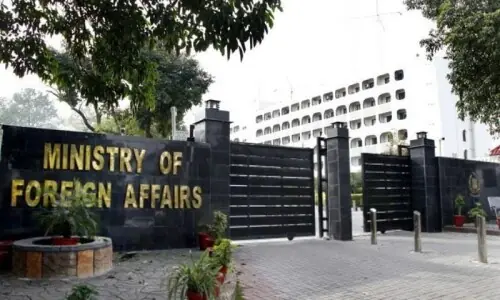The Foreign Office (FO) on Friday said that the Indian network of extra-judicial and extra-territorial killings was now a “global phenomenon” that required a coordinated international response.
The statement was issued after The Guardian, in a report published on Thursday, said that the Indian government assassinated individuals in Pakistan as part of a wider strategy to eliminate terrorists living on foreign soil.
The report cited intelligence officials from both countries, as well as documents shared by Pakistani investigators, saying they “shed new light on how India’s foreign intelligence agency allegedly began to carry out assassinations abroad as part of an emboldened approach to national security after 2019”.
India has denied the claims made in the report.
In a statement, the FO said that India’s assassination of Pakistani nationals on Pakistani soil was a clear violation of the country’s sovereignty and a breach of the UN Charter.
It also highlighted a press conference by Foreign Secretary Syrus Sajjad Qazi in January, wherein he had said there was “credible evidence” of links between Indian agents and the assassination of two Pakistani nationals in Sialkot and Rawalakot.
“These cases exposed the increasing sophistication and brazenness of Indian-sponsored terrorist acts inside Pakistan, with striking similarities to the pattern observed in other countries, including Canada and the United States,” the FO said.
In October 2023, Canadian Prime Minister Justin Trudeau had cited what he said was credible evidence of a potential link between Indian agents and the murder of a Sikh separatist leader.
The next month, the US Department of Justice had said an Indian government official directed an unsuccessful plot to assassinate a Sikh separatist on US soil.
“It is critical to bring to justice the perpetrators, facilitators, financiers and sponsors of these extra-judicial and extra-territorial killings. India must be held accountable internationally for its blatant violation of international law,” the FO said.
Report says Indian involvement in up to 20 killings in Pakistan
The Guardian report said that the accounts appeared to “give further weight to allegations that Delhi has implemented a policy of targeting those it considers hostile to India”. It noted that India has been publicly accused by Washington and Canada of involvement in the murders of dissident activists.
“The fresh claims relate to almost 20 killings since 2020, carried out by unidentified gunmen in Pakistan. While India has previously been unofficially linked to the deaths, this is the first time Indian intelligence personnel have discussed the alleged operations in Pakistan, and detailed documentation has alleged Research Analysis Wing’s (RAW) direct involvement in the assassinations,” it said.
It further said claims suggested that Sikh separatists in the Khalistan movement were targeted as part of these Indian foreign operations, both in Pakistan and the West.
The report, quoting Pakistani investigators, said, these killings were orchestrated by Indian intelligence sleeper cells “mostly operating out of the United Arab Emirates (UAE)”.
It quoted two Indian intelligence officers as saying that RAW’s shift to “focusing on dissidents abroad” was triggered by the 2019 Pulwama attack which killed scores of security personnel in held Kashmir in February 2019 and which India blamed on Pakistan.
“After Pulwama, the approach changed to target the elements outside the country before they are able to launch an attack or create any disturbance. We could not stop the attacks because ultimately their safe havens were in Pakistan, so we had to get to the source,” The Guardian quoted one Indian intelligence operative as saying.
Conducting such operations “needed approval from the highest level of government”, he said, adding that India “drew inspiration” from intelligence agencies such as Israel’s Mossad and Russia’s KGB.
The report cited unnamed senior officials from two separate intelligence agencies in Pakistan as saying that Islamabad suspected India’s involvement in up to 20 killings since 2020.
It said that the officials pointed to evidence relating to previously undisclosed inquiries into seven of the cases — including witness testimonies, arrest records, financial statements, WhatsApp messages and passports — which investigators said showcased in detail the operations conducted by Indian spies to assassinate targets on Pakistani soil. The Guardian said it had seen the documents, but they could not be independently verified.
The intelligence sources alleged that targeted assassinations increased significantly in 2023, accusing India of involvement in the suspected deaths of about 15 people, most of whom were shot at close range by unknown gunmen.
Investigators alleged that millions of rupees would often be paid to criminals or impoverished locals to carry out the murders, with documents claiming that payments were mostly done via Dubai. Meetings of RAW handlers overseeing the killings are also said to have taken also place in Nepal, the Maldives and Mauritius, the report said.
“This policy of Indian agents organising killings in Pakistan hasn’t been developed overnight. We believe they have worked for around two years to establish these sleeper cells in the UAE who are mostly organising the executions. After that, we began witnessing many killings,” a Pakistani official was quoted as saying.
The Guardian said that the figures it was given matched up with those collected by analysts tracking unclaimed militant killings in Pakistan.
Meanwhile, India categorically denied the report by The Guardian. India’s Ministry of External Affairs denied the claims, reiterating an earlier statement that they were “false and malicious anti-India propaganda”.
The ministry emphasised a previous denial made by Indian Foreign Minister Subrahmanyam Jaishankar that targeted killings in other countries were “not the government of India’s policy”.

































